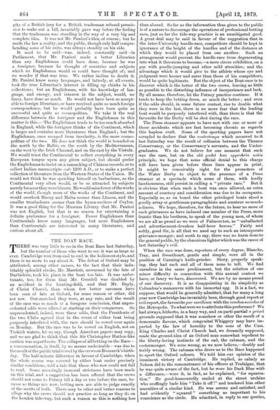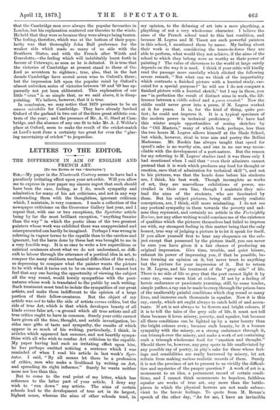THE BOAT RACE.
THERE was very little to see in the Boat Race last Saturday, but the number of those who went to see it was as large as ever. Cambridge won from end to end in the hollowest style, and there is no more to say about it. The defeat of Oxford may be attributed, among other causes, to the fact that their indu- bitably splendid stroke, Mr. Marriott, unwarned by the fate of Darbishire, took his place in the boat too late. It was unfor- tunate, too, for them that Mr. Grenfell was disabled by an accident in the hunting-field, and that Mr. Bayly, of Christ Church, than whom few better oarsmen have been seen of late at Oxford, for some reason or other, did not row. Out-matched they were, at any rate, and the result of the race was so much of a foregone conclusion, that unpre- cedented odds were offered at starting on their conquerors. So unprecedented, indeed, were these odds, that the Presidents of the two Clubs agreed that in the event of either boat being purposely interfered with, the race should be rowed over again on Monday. But the race was to be rowed on English, not on Turkish waters, let us say, though American papers may copy, and we are glad to think that this Sir Christopher Hatton-like caution was superfluous. The collapse of all betting on the Race— a consummation, in itself, by no means undesirable—was due to the result of the public trial rowed by the crews on Bismarck's birth- day. The hall-minute difference in favour of Cambridge, when the whole course was covered by either boat tinder precisely similar conditions, told a tale that those who row could not fail
to reed. Some amusingly immoral strictures have been made on this trial, and a suggestion has been offered that the crews should not come to Putney till a day or two before the race, be- cause as things are now, betting men are able to judge exactly of the merits of both. There may be other and better reasons to allege why the crews should not practice so long as they do on the London tide-way, but such a reason as this is nothing less
than absurd. So far as the information thus given to the public is of a nature to discourage the operations of professional betting men, just so far the tide-way practice is an unmitigated good. A great deal may be said in favour of the suggestion that in the inter-University hurdle-race, competitors should be kept in ignorance of the height of the hurdles and of the distance at which they would be placed from one another. Such an arrangement would prevent the hurdle-race from degenerating into what it threatens to become,—a mere circus exhibition, on a par with poodle-jumping and other mild atrocities; and the advantage which it would give to the athlete whose eye and judgment were keener and surer than those of his competitors, would be quite legitimate. But the object of the Boat-race is to discover which is the better of the two crews, leaving as little as possible to the disturbing influence of inexperience and luck. By all means, therefore, let the Putney practice continue. If it tends to keep the betting down, so much the better ; and even if the odds should, in some future contest, rise to double what they were in the last, there is no more fear that the leading boat would be purposely interfered with, than there is that the favourite for the Derby will be shot during the race.
The Press steamer appears to have met with one or more of those accidents which are fast becoming chronic as regards this hapless craft. Some of the sporting papers have not scrupled to declare that the contretemps which occurred to it last Saturday was the result of collusion between the Thames Conservancy, or the Conservancy's servants, and the Under- graduates. We do not believe for one moment that such was the case, but on the old pwlet hoc opprobria nobis principle, we hope that some official denial to this charge will have been given before these lines appear in print. It might be conceivably right for the promoters of the Water Derby to object to the presence of a Press steamer at a spectacle which some of them, with lordly facetiousness, still persist in calling a "private race." But it is obvious that when such a boat was once allowed, an extra amount of courtesy and consideration was due to its occupants. Especially so, as on board the other privileged boats stood a goodly array of gentleman-paragraphists and amateur so-much- a-liners. We hope, therefore, for the future, to hear no more of such grievances as have induced one member of the Press, more frantic than his brethren, to speak of the young men, of whom we are all as proud as we were of Palmers ton, as " unballasted and advertisement-drunken half-hour heroes." Fairly and softly, good Sir, is all that we need say to such an intemperate grievance-monger; and sooth to say, there was no harm done to the general public, by the obnoxious lighter which was the cause of last Saturday's evil.
When the race was done, reporters of every degree, Blanche, Tray, and Sweetheart, gentle and simple, were all in the position of Canning's knife-grinder. Story, properly speak- ing, they had each and all of them none to tell. We find ourselves in the same predicament, but the solution of one minor difficulty in connection with this annual contest we have, or fancy we have, discovered. We are by no means proud of our discovery. It is as disappointing in its simplicity as Columbus's manceuvre with his immortal egg. It is a fact, we suppose, that would be generally admitted, that for many a long year now Cambridge has invariably been, through good report or evil report, the favouritepar excellence with the couches sociales of the Metropolis. To what were we to attribute this preference? We had always, hitherto, in a hazy way, and on parti-partial a priori grounds supposed that it was somehow or other the result of a democratic flavour, which congenital Whiggery may have im- parted by the law of heredity to the sons of the Cam. King Charles and Christ Church had, we dreamily supposed, made the ground-idea of an Oxford man somewhat repellent to
the liberty-loving instincts of the cad, the cabman, and the costermonger. We were wrong, as we now believe,—doubly and trebly wrong. The cabman who drove us to the Race happened to sport the Oxford colours. We told him our opinion of the imminent victory of Cambridge. He replied, as calmly as Nelson did to the remonstrance of his officers at Trafalgar, that
he was quite aware of the fact, but he wore his Dark Blue with a difference,—wore it, in fact, as he explained, "for squarea-
tion." He good-humouredly smiled at the street urchins who scoffingly bade him "Take it off !" and tendered him other amenities of a similar kind. He was serene and satisfied, and had evidently " squared " something as important to his conscience as the circle. He admitted, in reply to our queries,
that the Cambridge men were always the popular favotuites in -London, but his explanation scattered our theories to the winds. He held that they were so because they were always being beaten. The feeling, therefore, which was at the bottom of their popu- larity was that thoroughly John Bull preference for the 'weaker side which made so many of us side with the Southern States, and with the French after Worth and Gravelotte,—the feeling which will indubitably burst forth in favour of Cetewayo, as soon as he is defeated. It is true that the victories of Cambridge at present stand to those of Ox- ford as seventeen to eighteen ; true, also, that in the last decade Cambridge have scored seven wins to Oxford's three; but the impression left upon the popular mind by Oxford's almost unbroken series of victories between '49 and '69 has ap- parently not yet been obliterated. This explanation of our little " crux " is so simple that, as we said above, it is disap- pointing. We believe, however, that it is true.
In conclusion, we may notice that 1879 promises to be an annus mirabilis for Cambridge. They have already lurched Orford of the garland in two out of the three great athletic con- tests of the year; and the presence of Mr. A. G. Steel at Cam- bridge, and the absence of any one fit to take Mr. A. J. Webbe's place at Oxford, seem to make the result of the cricket-match at Lord's next June a certainty too great for even the "glar- ing uncertainty of cricket" to jeopardise.



































 Previous page
Previous page